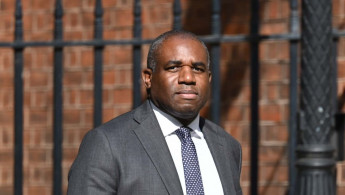UK FM Lammy slammed for suggesting Syria migrant deal with Assad
UK Foreign Secretary David Lammy has come under fire by human rights groups and Syrian activists after suggesting the British government was interested in setting up 'upstream schemes' with Syria.
Human rights groups and Syrian activists expressed dismay at the idea, reminding the government that not only is Syria not safe to return to, but that its government has detained thousands of people, including returnees.
Director of the documentary film 'Syria's Disappeared', Sara Afshar, said she was shocked to hear Lammy's comments alluding to the scheme.
"My friend, a torture survivor, returned there [to Syria], was immediately arrested by the Assad regime [and] as been disappeared since," she said in a post on X, adding "There are many other stories. Over 100,000 [people] are still disappeared, [including] kids."
Ranim Ahmed, the communications director of The Syria Campaign, told The New Arab that Lammy's remarks were akin to "replacing a racist scrapped scheme with another racist scheme".
"Refugees must be protected. Seeking asylum is a basic human right, not a crime, and people should never be punished for seeking safety and a better life, especially for those who fled oppression and persecution in their own countries."
Lammy told BBC's Sunday with Laura Kuenssberg that the government was "interested in discussing with Italy the schemes they've developed, not just with Albania but upstream schemes with Syria and Libya as well."
According to the UN, the country is in the depths of the worst humanitarian crisis since the beginning of the war, which has seen around 500,000 people killed since beginning in 2011, many by the regime itself in its indiscriminate bombardment of civilian areas and repression of dissidents.
The Foreign, Commonwealth and Development Office told The New Arab that the British government does not engage with the Assad regime and that Lammy's comments did not mean that the UK would take on board Italy's schemes.
Lammy's comments came after Prime Minister Keir Starmer had travelled to Italy on Sunday to meet with Italian Prime Minister Georgia Meloni over Italy's asylum strategy in the Mediterranean.
During his visit, Starmer said he had discussed Italy's 'upstream schemes' with Tunisia and Libya which had seen both countries stop crossings launched from their shores towards Italy.
Additionally, Starmer said he had discussed Italy's scheme with Albania, which sees the country process asylum claims on its territory rather than in Italy itself.
"Preventing people leaving their country in the first place is far better than trying to deal with those that have arrived in any of our countries, so I was very interested in that," Starmer said.
"In a sense, today was a return – if you like – to British pragmatism," he added.
According to the European Union's border agency Frontex there has been a 64 percent reduction in the number of crossings over the central Mediterranean since the beginning of 2024, much of which goes to Italy.
Lammy's comments about Syria come amid talk that a number of European countries, including Syria, will change their policy towards Syrian refugees and asylum seekers.
In July, a letter signed by the foreign ministers of Austria, Croatia, Cyprus, the Czech Republic, Greece, Italy, Slovakia and Slovenia, called on the EU to review its Syria policy.
This includes changing its relations with the Assad regime, which has largely been cut off since the start of the war, and enabling the return of Syrian refugees by improving the conditions in the country.
Yasmen Almashan, president of Caesar Families Association told The New Arab accused European countries of blaming their political and economic situation on the migrant crisis, and that the reason so many Syrian refugees refuse to return to Syria is for fear of detention upon arrival and torture, a policy documented by UN Fact Finding Mission on Syria.
"The desire of refugees to return is significant, but it remains impossible as long as the security situation remains dangerous," he added.




 Follow the Middle East's top stories in English at The New Arab on Google News
Follow the Middle East's top stories in English at The New Arab on Google News
![A group of Palestinians, foreign and Israeli activists gather to participated in an olive picking event on the land in the town of Battir, which is under threat of confiscation by Israel in Bethlehem, occupied West Bank on 8 November 2024. [Getty]](/sites/default/files/styles/image_330x185/public/2182930803.jpeg?h=199d8c1f&itok=__0LgGsa)

![People gathered around the rubble of destroyed houses to search for survivors [Getty]](/sites/default/files/styles/image_330x185/public/2024-11/GettyImages-2184733820.jpg?h=199d8c1f&itok=NiM1LO2f)